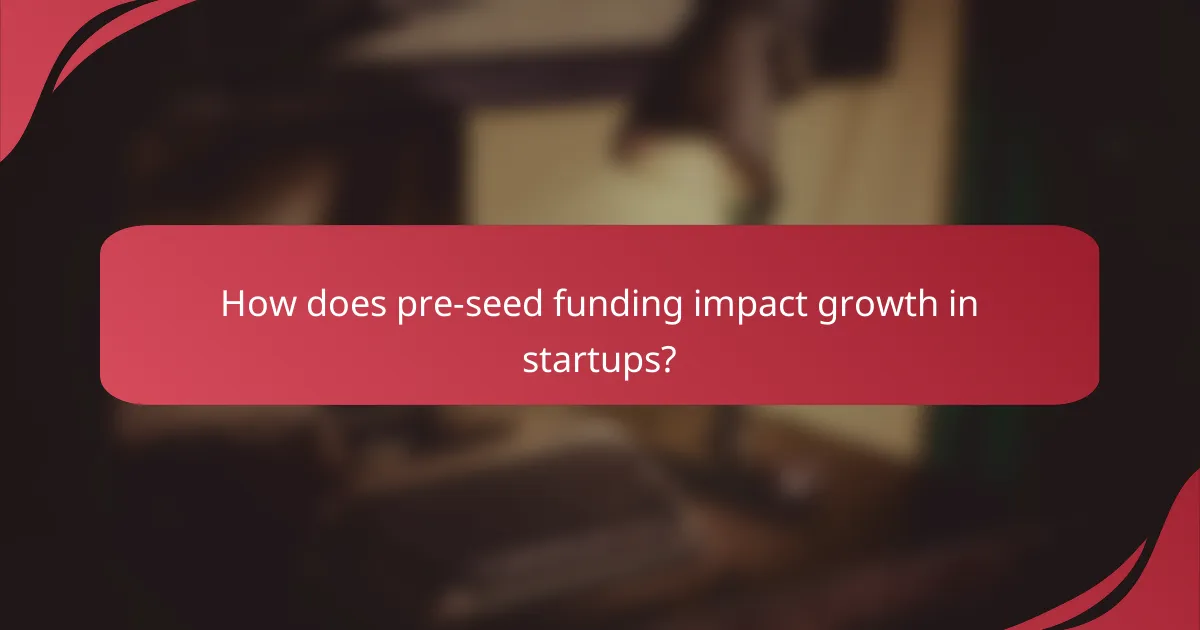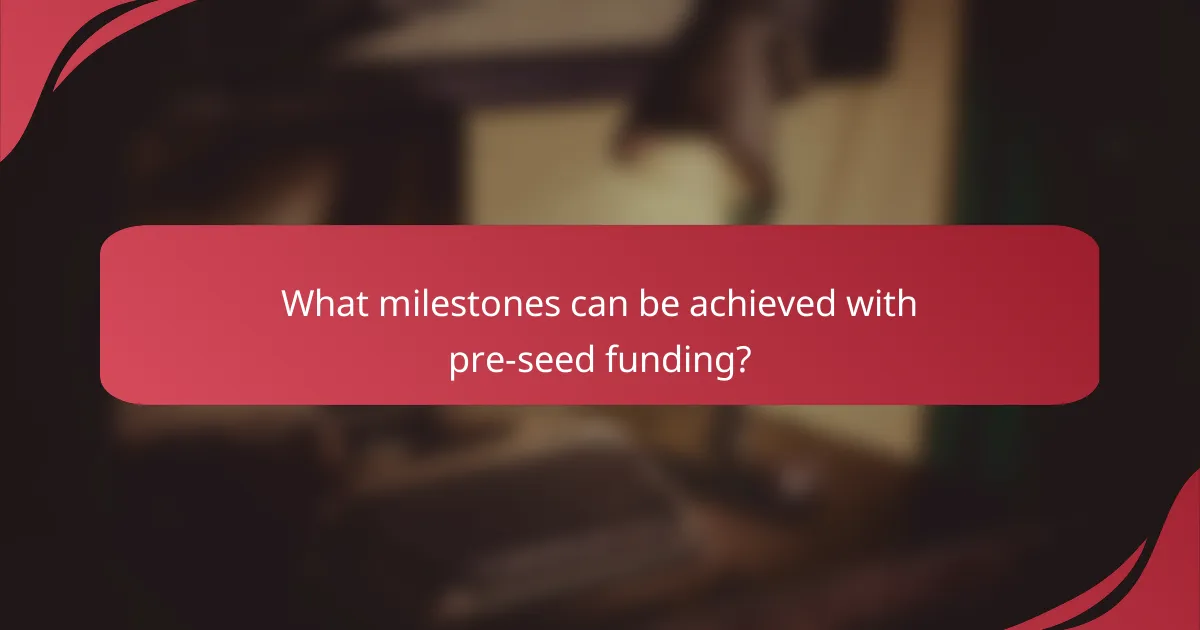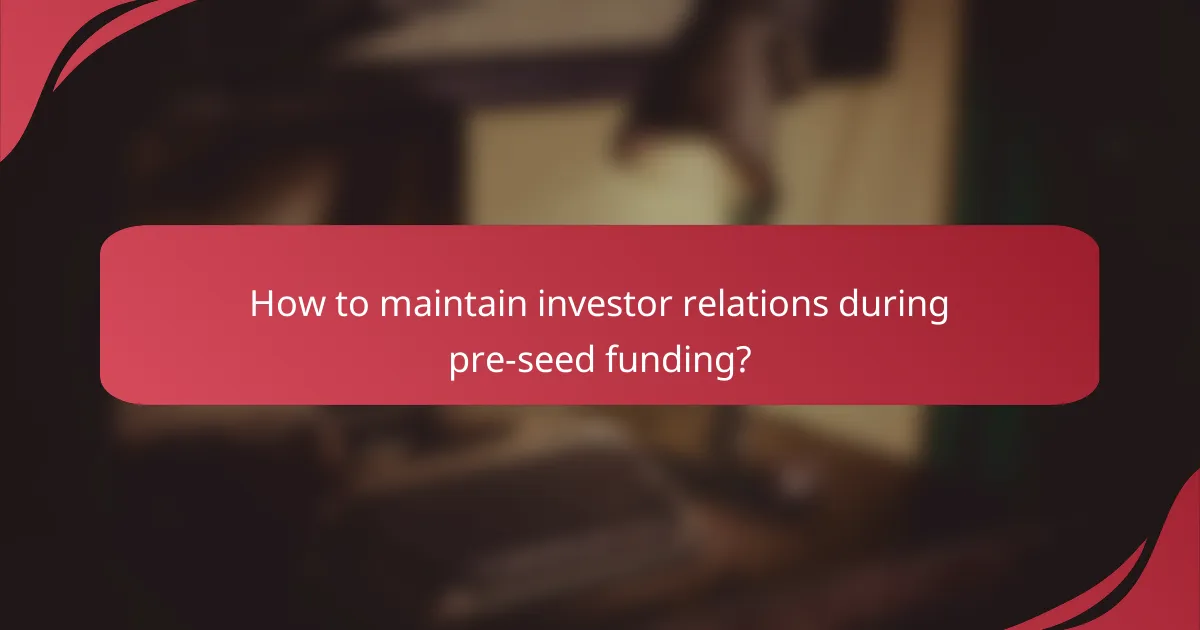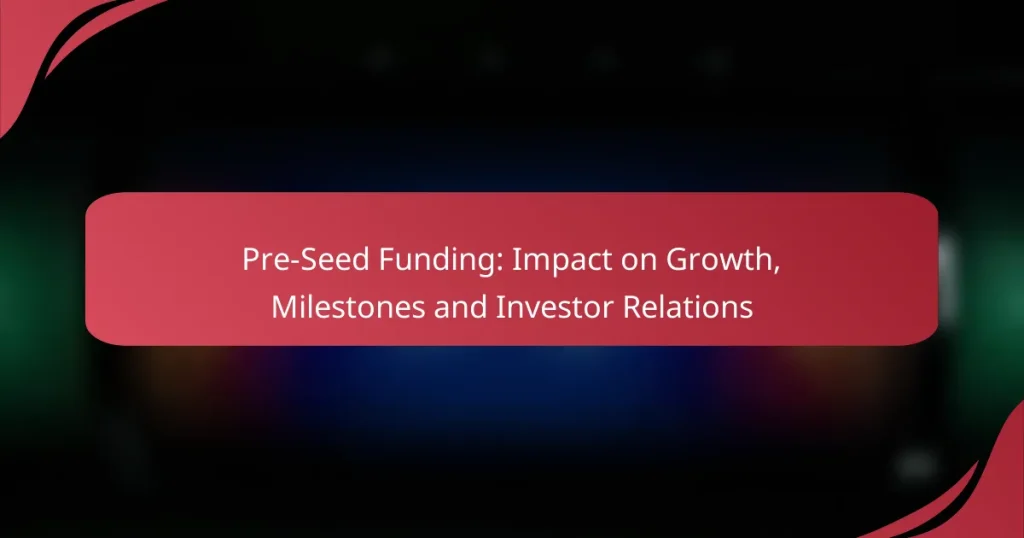Pre-seed funding plays a pivotal role in shaping the growth trajectory of startups by providing the necessary capital for early-stage development. This initial investment allows startups to refine their products, test the market, and establish a brand presence, which are essential milestones for attracting future investment. Additionally, fostering strong investor relations during this phase is vital for building trust and ensuring continued support as the startup evolves.

How does pre-seed funding impact growth in startups?
Pre-seed funding significantly influences the growth trajectory of startups by providing essential capital for early-stage development. This initial investment enables startups to refine their products, enter markets quickly, and build foundational operations that are crucial for scaling.
Accelerates product development
Pre-seed funding allows startups to focus on product development without the pressure of immediate revenue generation. With this capital, founders can invest in research, design, and prototyping, ensuring they create a viable product that meets market needs.
For example, a tech startup might use pre-seed funds to develop a minimum viable product (MVP) within a few months, rather than waiting for later funding rounds. This rapid development can help secure further investment and validate the business concept early on.
Enhances market entry speed
Access to pre-seed funding enables startups to enter the market faster by covering initial marketing and operational costs. This speed is crucial in competitive industries where being first can lead to significant advantages.
Startups can allocate funds to marketing campaigns, partnerships, or pilot programs, which can help them gain traction and establish a customer base quickly. For instance, a food delivery startup might launch its service in a targeted area, using pre-seed funds for promotions and logistics.
Increases operational capacity
Pre-seed funding enhances a startup’s operational capacity by allowing for the hiring of essential staff and the acquisition of necessary tools and technologies. This investment is vital for building a solid foundation for future growth.
Startups can hire key personnel such as developers, marketers, or sales representatives, which can significantly improve productivity and efficiency. For example, a startup might hire a small team to manage customer service, ensuring a better customer experience from the outset.
Boosts team recruitment
With pre-seed funding, startups can attract and retain talent by offering competitive salaries and equity options. A strong team is critical for executing the business vision and driving growth.
Startups can leverage funding to create an appealing work environment, which includes not only compensation but also benefits and a positive company culture. This investment in human capital can lead to higher employee satisfaction and lower turnover rates.
Facilitates customer acquisition
Pre-seed funding plays a crucial role in customer acquisition by enabling startups to invest in marketing strategies that effectively reach their target audience. This initial outreach is essential for building a customer base and generating early revenue.
Startups can use funds for digital marketing, social media campaigns, or promotional events to attract customers. For instance, a subscription box service might run targeted ads to gain initial subscribers, setting the stage for future growth.

What milestones can be achieved with pre-seed funding?
Pre-seed funding can help startups achieve critical early milestones that set the foundation for future growth. These milestones often include developing prototypes, testing the market, and establishing a brand presence, all of which are essential for attracting further investment.
Prototype development
With pre-seed funding, startups can focus on prototype development, which is crucial for visualizing their product concept. This phase often involves creating a basic version of the product that demonstrates its core functionalities. Startups should aim to build a prototype that effectively communicates their vision to potential investors and customers.
Investing in user-friendly design and functionality during this stage can significantly enhance the prototype’s appeal. Gathering feedback from early users can also help refine the product before moving to the next stages of development.
Initial market testing
Initial market testing allows startups to validate their product idea and assess market demand. This can involve surveys, focus groups, or small-scale launches to gather insights on customer preferences and pain points. Startups should prioritize testing with a target audience that closely resembles their ideal customer profile.
Effective market testing can reveal critical information about pricing, features, and user experience, helping to shape product development. Startups should be prepared to pivot based on feedback to better meet market needs.
Building a minimum viable product (MVP)
Creating a minimum viable product (MVP) is a key milestone that allows startups to launch a functional version of their product with essential features. The MVP serves to attract early adopters and gather real-world usage data. Startups should focus on delivering the core value proposition while keeping development costs manageable.
It’s advisable to iterate on the MVP based on user feedback, gradually adding features that enhance the product’s value. This approach minimizes risk and helps ensure that the final product aligns with market expectations.
Establishing brand presence
Establishing a brand presence is vital for gaining visibility in a competitive market. Pre-seed funding can support branding efforts, including logo design, website development, and social media marketing. Startups should create a clear brand identity that resonates with their target audience.
Consistent messaging across all platforms can help build trust and recognition. Engaging with potential customers through content marketing and community outreach can further enhance brand visibility and loyalty.
Securing early partnerships
Securing early partnerships can provide startups with valuable resources, expertise, and market access. Pre-seed funding can facilitate networking opportunities and collaboration with established companies or industry influencers. Startups should seek partnerships that align with their business goals and can enhance their credibility.
These partnerships can lead to co-marketing opportunities, shared resources, or even distribution channels, which can significantly accelerate growth. Startups should approach potential partners with a clear value proposition that highlights mutual benefits.

How to maintain investor relations during pre-seed funding?
Maintaining strong investor relations during pre-seed funding is crucial for building trust and ensuring ongoing support. Regular communication, transparency, and engagement are key strategies to keep investors informed and involved in your startup’s journey.
Regular updates and communication
Consistent updates are essential for keeping investors engaged and informed about your startup’s progress. Aim to provide monthly or bi-monthly updates that cover key milestones, challenges, and future plans.
Utilize various channels such as email newsletters, video calls, or dedicated investor portals to share information. This not only keeps investors in the loop but also fosters a sense of partnership.
Transparent financial reporting
Clear and honest financial reporting builds credibility with investors. Provide regular insights into your financial health, including cash flow, expenses, and revenue projections.
Consider using simple financial dashboards or reports that highlight key metrics. This transparency helps investors understand your business’s financial trajectory and reassures them about their investment.
Setting clear expectations
Establishing clear expectations from the outset helps prevent misunderstandings. Clearly outline your goals, timelines, and what you need from investors in terms of support and resources.
Document these expectations in a formal agreement or a simple one-page overview. This clarity can help align interests and ensure everyone is on the same page as your startup evolves.
Engaging in feedback loops
Creating feedback loops allows for constructive dialogue between you and your investors. Encourage them to share their thoughts on your progress and strategies, and be open to their suggestions.
Regularly solicit feedback through surveys or direct conversations. This engagement not only strengthens relationships but also provides valuable insights that can enhance your business strategy.

What are the key criteria for attracting pre-seed investors?
Attracting pre-seed investors hinges on several key criteria, including a strong business model, a compelling value proposition, and an experienced founding team. These elements not only demonstrate the potential for growth but also build investor confidence in the startup’s future success.
Strong business model
A strong business model outlines how a startup plans to generate revenue and sustain operations. Investors look for clarity in the revenue streams, whether through direct sales, subscriptions, or other methods. It’s essential to present a model that is scalable and adaptable to market changes.
Consider using a simple canvas model to visualize your business structure, highlighting key components like customer segments, value propositions, and cost structures. This can help investors quickly grasp the viability of your business.
Compelling value proposition
A compelling value proposition clearly articulates the unique benefits your product or service offers to customers. It should address specific pain points and explain why your solution is superior to existing alternatives. This clarity can significantly influence investor interest.
To refine your value proposition, focus on customer feedback and market research. Use concise messaging that resonates with your target audience, and be prepared to pivot based on what you learn from potential users.
Experienced founding team
An experienced founding team is crucial for attracting pre-seed funding, as investors often bet on the people behind the idea. Highlighting relevant backgrounds, skills, and past successes can build credibility and trust. A diverse team with complementary skills is particularly appealing.
When presenting your team, include brief bios that showcase individual expertise and past achievements. Consider emphasizing any industry connections or previous entrepreneurial experiences that can enhance your startup’s prospects.


